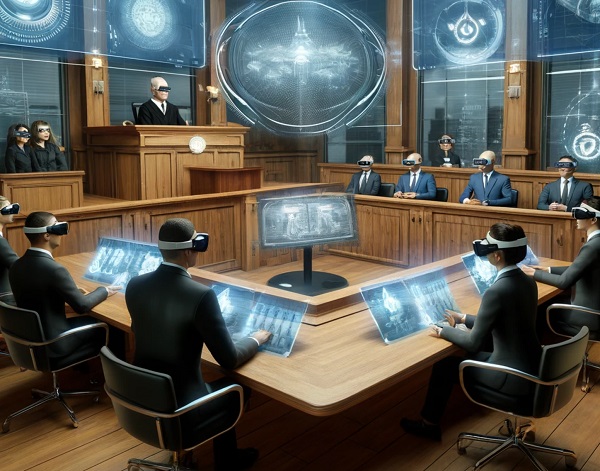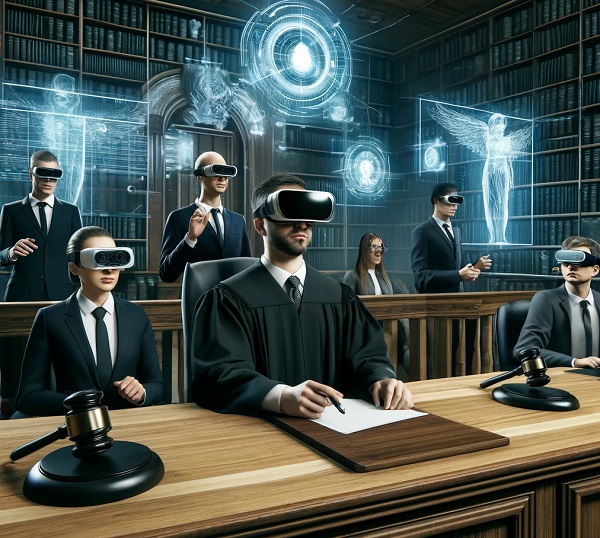Virtual Reality (VR) is revolutionizing numerous sectors, from gaming and entertainment to education and training. Yet, one area that might not immediately come to mind when considering VR is its potential use in the courtroom. As legal systems worldwide continue to evolve, the integration of technology like VR could potentially revolutionize traditional legal procedures, offering a new era of justice.
Background Information
The courtroom has always been a place of oration and evidence, with a format that has seen only incremental changes over the centuries. Meanwhile, VR technology has matured significantly, offering immersive experiences that convincingly replicate real-world environments. Could these two worlds meet to enhance the justice system?
Potential Benefits of Using VR in Courtrooms
Enhanced Evidence Presentation
One of the most compelling uses of VR in legal settings is the visualization of complex scenarios, such as crime scenes or accidents. For an accident lawyer, VR could be a game-changer, enabling juries to virtually visit the scene of an incident to understand the circumstances of a crash better. This could lead to more informed decision-making based on a deeper understanding of the evidence presented. Furthermore, VR could also be used to present complex data or scientific evidence in a more accessible and understandable way.
Witness Testimony and Cross-Examination
VR also offers the potential for witnesses to provide testimony remotely, placing them within a digitally reconstructed scene of the crime or event to describe their experiences. This could be particularly beneficial for those who are unable to attend court in person due to distance, health, or security concerns, thereby enhancing the accessibility of the justice system.
Jury Deliberation
For jurors, VR could serve as a tool to revisit a crime scene or reexamine critical evidence through simulations. This could ensure all jurors have a clear and direct understanding of the spatial and situational context of the case, potentially leading to more accurate verdicts.

Challenges and Concerns
Legal and Ethical Implications
The use of VR raises significant legal and ethical questions, including the accuracy and authenticity of the virtual environments. Ensuring that VR recreations do not enhance or diminish certain aspects to sway jury opinion is paramount. However, there is also the potential for misuse of VR, such as the creation of misleading or false evidence, which underscores the need for robust safeguards and regulations.
Technical and Practical Barriers
Despite its benefits, the adoption of VR in legal settings is hampered by high costs and the need for specialized equipment. Additionally, both legal professionals and jurors would need training on how to use this technology effectively, which could be a significant hurdle. Furthermore, the introduction of VR could potentially change the role of legal professionals, with lawyers needing to understand and present evidence in a virtual environment.
Admissibility and Standardization
A major legal hurdle is the establishment of standards for the admissibility of VR-generated evidence. The legal system will need to develop clear guidelines on how VR content should be created, used, and presented in court. This includes addressing potential biases that could be introduced by VR, such as the framing of a virtual crime scene or the portrayal of a witness’s emotions.
Case Studies and Current Experiments
Although still in its infancy, there are already instances where VR has been used experimentally in courtrooms. For instance, in a recent case in [City], VR was used to recreate a crime scene, allowing the jury to virtually walk through the scene and gain a better understanding of the events. These pilot cases serve as preliminary investigations into how VR could be integrated more broadly into legal proceedings.
Expert Opinions
Experts in legal technology express cautious optimism about VR in courtrooms. While acknowledging the potential benefits, they also highlight the challenges of ensuring fair and equitable use. Legal scholars, technologists, and ethicists continue to debate VR’s implications on the legal system‘s fundamental workings.
The integration of VR into courtrooms represents a significant technological leap. The potential benefits of evidence presentation, witness testimony, and jury deliberations are immense. However, significant challenges in terms of legal admissibility, ethical implications, and practical implementation remain. The coming years will determine whether VR can move from experimental use to a standard legal tool.
The future of VR in courtrooms is not just a topic for legal professionals but for all citizens interested in the evolution of our justice system. We value your insights and invite you to share your thoughts and experiences, especially those in the legal field. How prepared do you think the system is for such a technological shift? Let’s engage in a meaningful discussion.
